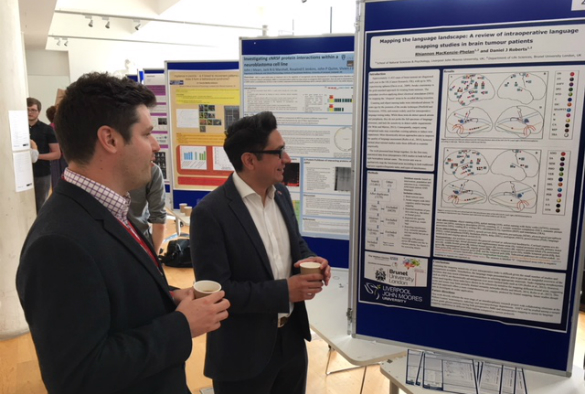More than one hundred delegates attended this year’s Liverpool Neuroscience Day to celebrate active neuroscience research across the city-region and beyond.
The annual event, organised by the Liverpool Neuroscience Group, provides an opportunity for researchers to hear about the work going on within other groups, institutions and disciplines in the region. Over a hundred delegates attended to hear seventeen diverse speakers on a huge range of neuroscientific topics. Fifty posters were also presented, providing centres for discussion during coffee breaks and lunch and allowing postgraduate and post-doctoral researchers to present their work.
The meeting was supported by the University’s Institute of Translational Medicine and the Pain Relief Foundation, a Liverpool-based charity that funds research into the causes and treatment of human chronic pain. The first scientific session reflected this partnership, with acollection of diverse talks on the theme of pain and the peripheral nervous system.
The plenary lecture by Professor Joe Herbert from the University of Cambridge provided a stimulating and inspiring view of the challenges in studying depression as a disease of the brain, understanding why certain people develop depression, particularly in childhood and early adulthood, and distinguishing association from causation when examining risk factors.
Other talks reflected the breadth of research being undertaken in the region, such as the role of non-coding DNA, specifically retrotransposons, in neurodegenerative diseases, an overview of the strengths and challenges using C.elegans as a model for neurological diseases, and the development of “smart nanocarriers” for delivering therapeutic agents to the central nervous system. Further talks gave an insight into fNIRS a method of non-invasively measuring cortical blood flow and the potential of using Schwann cells to repair the central nervous system.
The audience also heard an interesting hypothesis that speech may have co-evolved with the use of tools thousands of years ago, based on findings from functional brain imaging studies and work on the analysis of seizure frequency in epilepsy studies- making outcomes more relevant to patients’ priorities was described.
The day ended with a ‘call to action’ for neuroscientists to continue to strengthen collaborative ties between different disciplines and institutions, and to get involved in the Liverpool Neuroscience Group, which exists to bring together researchers and clinicians from all disciplines related to the nervous system, from the most basic of cellular neuroscience, clinical neurology and neurosurgery, to cognitive psychology and psychiatry with the aim of fostering collaboration between universities and clinical settings in Liverpool, but also further afield.
Please contact Liverpool Neuroscience Group for further information.
